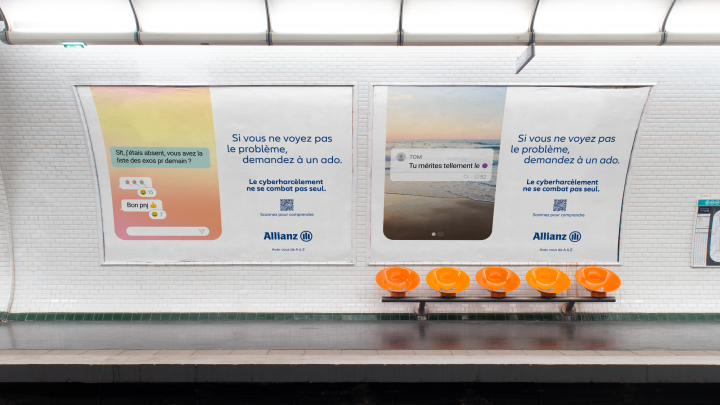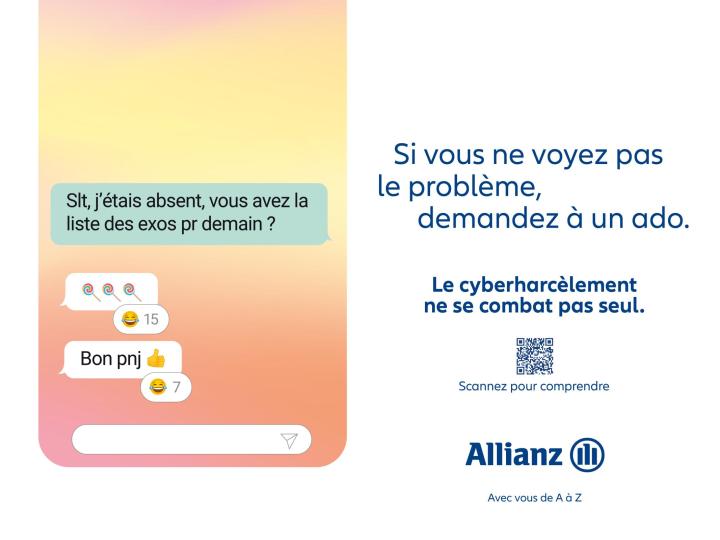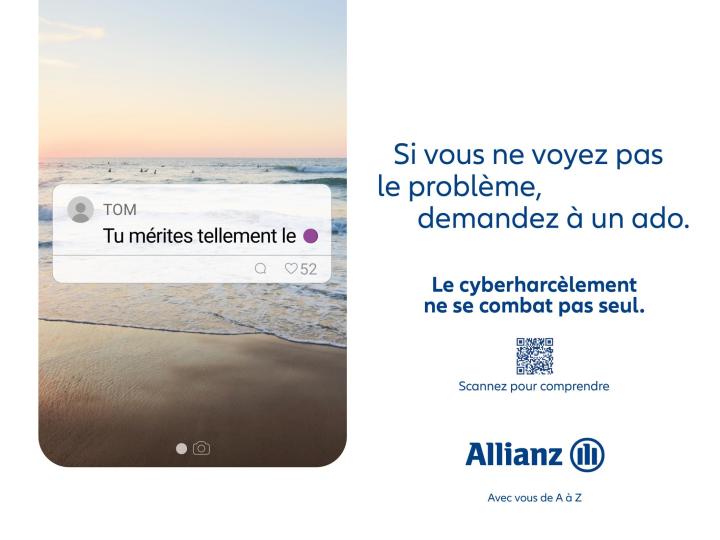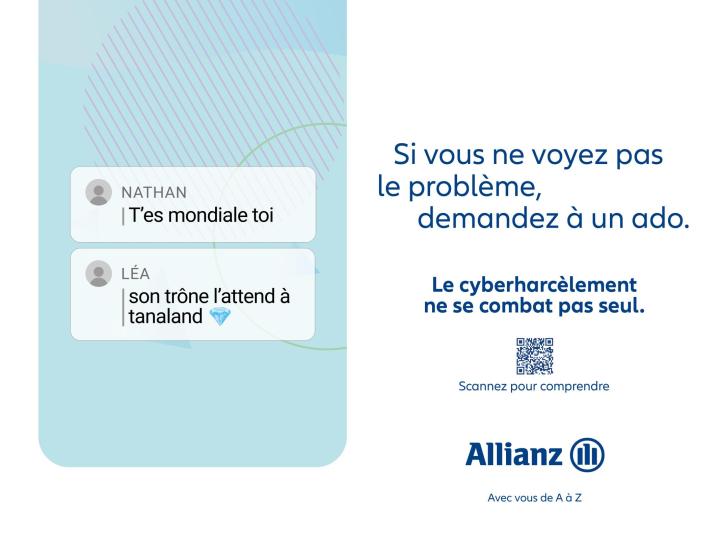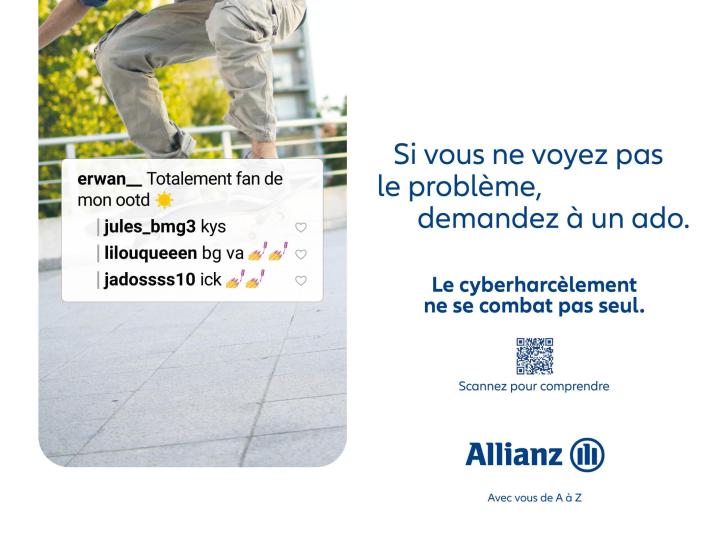KYS, NPC, 🍭, 🌽... EMOJIS CAN MASK DEEPLY HURTFUL MESSAGES
While bullying has always existed, the rise of social media has changed its form and scale. Cyberbullying - facilitated by smartphones - can be constant, invisible, and infiltrate even bedrooms.
Primary agents of prevention and intervention: trusted adults (parents, educators, grandparents, etc.), with a crucial role: recognizing cyberbullying.
How can one understand the coded language of cyberbullying—hidden behind emojis or abbreviations? Harassment has become increasingly insidious and adaptable, especially on social media.
With its new awareness campaign, Allianz France exposes the coded language teens use online and highlights the intergenerational gap between parents and teens.
Although 75% of adults say they understand emoji/SMS language, only 1.3% passed the test!
WHEN YOU DON"T SPEAK THE SAME LANGUAGE, HOW DO YOU DECTET VIOLENCE OR FIGHT CYBERBULLYING ?
According to an IFOP/Allianz France study (May 2025), while 75% of French people believe they understand teen language, only 1.3% could correctly interpret 6 real-life examples. Many misinterpreted dangerous or hateful meanings as positive.
These figures show the urgent need for better intergenerational communication to spot online abuse.
“Digital tools have transformed our lives. They connect, entertain, and inform—but also expose us. Teens especially are vulnerable. A message can hurt as much as a punch. We want to expose the coded language behind online harassment to help adults protect teens. We designed a campaign that adults cannot understand without a teen’s help—to spark conversations,” — Constance Wiblé, Director of Brand & Communications at Allianz France.
A CAMPAIGN INITIATING CONVERSATION BETWEEN ADULTS AND TEENS TO FIGHT AGAINST BULLYING
Cyberbullying is defined as “an aggressive, intentional act carried out by a group or individual using electronic communication repeatedly against a victim who cannot easily defend themselves.”
Teens are especially vulnerable. One-third get their first phone before age 11. Currently, 1 in 6 school-age children experience cyberbullying—most commonly at age 11 for boys, 13 for girls.
Allianz France was one of the first insurers to act on this issue in 2018, offering prevention tools and insurance solutions.
In 2024, Allianz France and Ogilvy Paris launched the impactful campaign “The Flip Side of the Medal,” sharing testimonies from 8 athletes in the Allianz Team who had experienced cyberbullying. The insults they received were engraved on the backs of medals—exposing the dark side of online fame.
This year, Allianz France continues its commitment with a new campaign by Ogilvy Paris targeting adults with teens in their lives. It reveals the hidden messages in teen-coded language (emojis, algospeak, references) to better fight online abuse.
Running from May 19 to June 8, 2025, the campaign appears in 377 cities, in train stations, subways, regional press, and on social media (Facebook, Instagram, TikTok). It uses a QR code linking to a learning platform with a glossary, practical tools to identify early signs of cyberbullying, and advice for starting conversations between adults and teens.
To broaden the campaign’s reach, influencers of all ages—from teens to parents—will help raise awareness and test adults’ knowledge of coded language.
“Insurance must adapt to everyday digital risks. Psychological support is vital, so we increased coverage to €850, ensuring long-term access to quality care,” — Cyril Leclerc, Deputy CEO of Allianz Legal Protection.
Allianz France’s Legal Protection policy, with the Digital Life Enhancement, includes:
- Legal support for identity theft, data breaches, and e-reputation damage
- Psychological support now up to €850 (around 12 sessions)
- Expert intervention to reduce visibility of harmful online content
Since 2021, Allianz school insurance includes up to 12 hours of psychological support for bullying, extortion, or assault.
Their health insurance plan also includes “My Mental Health Support” with 12 reimbursed sessions per year and coverage for additional sessions (up to €280 depending on the policy).
(1) Étude online réalisée par Occurrence (Groupe IFOP) en mai 2025 pour Allianz France auprès de 1008 Français âgés de 18 ans et plus, représentatifs de la population française (méthode des quotas). À noter que 26% des répondants sont des parents d'enfants âgés de moins de 15 ans et que 59% côtoient des jeunes de 12 à 18 ans dans leur entourage personnel ou professionnel.
(2) Source : étude Statista - 2025
(3) Source : étude OMS/Europe - 2024
